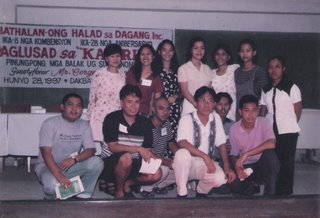Sa dihang nagpahibalo si higalang magbabalak Michael U. Obenieta, pangulo sa Bathalan-ong Halad sa Dagang (Bathalad)-Cebu, sa 2006 Bathalad-Cebu Tigi Sa Sinulatay, diin usa sa mga kategoriya mao ang Balak, usa ako sa mipadalag tampo. Ug niadtong Oktubre 1, 2006 gihimo ang awarding ceremonies didto sa Mountain View Park Resort, Lahug, Cebu City. Ania ang pungpong sa akong mga balak nga nakadaog sa Ikatulong Ganti nga giulohan og KAPALARAN UG UBAN PANG BALAK
MGA BINUHIANG LANGGAM SA SIYUDAD
pagdason sa kangitngit
kami morag mga kuwaknit
manglugwa sa kuweba
pinintalan among panagway
pulos maanyag tan-awon
labi nag madan-agan
sa kinidlap sa de kolor
nga mga bombelya
sulod sa mga balay-
kalingawan-kahilayan
kami maoy bida
mga kostumer nga nalurong
sa giyarok nga bino ug serbesa
morag makakitag prinsesa—ilang
mga mata mosiga kon kami
mosayaw na atubangan kanila
apan kami ray bida nga tinamay
kay sa katawhan gianggaan
mugbog lupad nga mga langgam
oo, ang katawhan ning kalibotan
sama sa mga langgam:
ang hinawayon,
mga hiniktan
ang tinamay (kaming mga G.R.O.)
mga binuhian
KAPALARAN
May pasas nga mipilit sa abaga ni Nanay.
Ingon sila nagpas-an siyag kasakit nga di
hitupngan. Mao diayng kanunay syang
makatilaw og kulata sa akong ama-ama.
Gikusi akong kasingkasing nga nagsud-ong
karon sa iyang kalawasan kay sa mga punok
gilikosan. Siyay nahungawan sa gahom
sa alak nga sa akong ama-ama gilaklak.
May alom usab ako sa abaga. Apan kon ako
makakwarta, ipatangtang ko kining pasas
nga mipilit sa akong panit. Dili ko buot
mosubay sa dalang giagian ni Nanay
POSTCARD GIKAN SA SUGBO
Matag gabii, gipintalan sa lainlaing bulok
ang dagway sa Sugbo. Yuna, tan-awa ra god ni.
Di ba kini tore nga mipaturatoy pagtubo
paingon sa kawanangan? Paminaw. Di ba
makabungog ang lanog sa live bands, cocktail
lounges ug videoke bars? Samtang sa daplin
sa Fuente Osmena, amang ang mga punoan
sa Acacia nga misaksi sa pangaliya ni Dodong:
Limos mo, Sir, Maam. Maluoy mo, Sir, Maam.
LUYO SA SAADSa imong pagbiya aron mangapkap
og berdeng kapalaran didto sa nasod
ni Ingko Samuel, gikawras sa kukhang
mga tudlo ang imong kasingkasing. Ug
wala mo kapugngi ang mga luha sa kawili
paghalok sa imong mga aping. Sa likod
sa imong mga bakho mituyhakaw bug-os
mong saad kanako: Di ko kalimtan tabunon
kong diwa ni putlon ang pising mitakgos
sa kasaysayan sa atong pagkakabos.
Apan gilumbuwad ngadto sa kawalaan
sa napulak nga mga adlaw, buwan ug tuig
ang imong panumpa nga mobalik sa yutang
pinangga aron mosingo sa lab-as nga hangin,
modimdim sa bag-ong dawat sa sanggotan,
mokaon og mais pinarisan sa ginamos pinaisan.
Minunot kini sa ritmo sa panultihon nga ang saad
gihimo aron pakyason. Ug kini ang labing pait:
Di ka na makasulti sa namat-an mong Binisaya.
Kay misanong kang hilhilon imong dila ug
tingalon imong kaisipan sa hunit nga pinulongan.
SA KARAANG CASA
Ang kausisero sa batan-ong
hunahuna maoy nagtukmod
kanako. Milayat kos bentana.
Busa ania ako ning karaang
casa karon. Wa nay nagpuyo.
Mingaw. Nahanaw ang talinis
nga talidhay sa binuhian apan
di makalupad nga mga langgam.
Maoy nahibilin gubaong katre,
gitungtongan sa nawataswatas
nga kutson. Sa may alkuba,
nahimong bombelya ang
mga lawalawa sa panahon.
Sa may banggira, mikinlaw
nga nakighagwa sa bidlisiw
ang buak nga baso. Nanambo
ko. Ug maoy akong nasugat
ang hinagtik sa mga taligsik.
ANG AGILA KANIADTO NAHIMONG MAYA KARONMay agila sa iyang dughan. Tan-awa.
Naglupad. Nagsiga ang mga mata.
Ang mga pako nanagkapakapa. Nagsuliyaw
sa talinis nga talidhay. Iyang sungo
nagbuka, andam mopahit bisag unsa.
Kon siya magpasopaso sa kanto, kanunay
abli ang iyang dughan, aron ang agila
makit-an sa katawhan. Sa katilingban
siya gikahadlokan, giayran. Dihay kausa
iyang gikulata ang anak sa kapitana
kay sa iyang pagkasiga wala moila.
Apan karon, human gitukob sa kagahapon
ang pito ka dekada, ang iyang kalagsik
napadpad, mikuyog sa langaw nga
way pamahaw. Mga bukton nawad-ag umoy.
Ug sa mga bagang sapot siya nagsapaw
kay nahadlok sa bulhot sa panuhot
ug kupog sa tun-og. Ang iyang likod,
sa osteoporosis gipugos sa pagbawog.
Ug tin-aw ang gitug-an sa panahon:
Ang agila kaniadto nahimong maya karon.
















